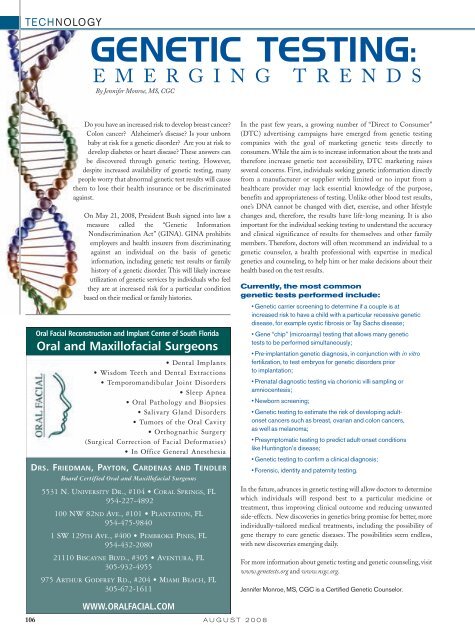August 2008 - the Parklander
August 2008 - the Parklander
August 2008 - the Parklander
You also want an ePaper? Increase the reach of your titles
YUMPU automatically turns print PDFs into web optimized ePapers that Google loves.
TECHNOLOGY<br />
GENETIC TESTING:<br />
E M E R G I N G T R E N D S<br />
By Jennifer Monroe, MS, CGC<br />
Do you have an increased risk to develop breast cancer?<br />
Colon cancer? Alzheimer’s disease? Is your unborn<br />
baby at risk for a genetic disorder? Are you at risk to<br />
develop diabetes or heart disease? These answers can<br />
be discovered through genetic testing. However,<br />
despite increased availability of genetic testing, many<br />
people worry that abnormal genetic test results will cause<br />
<strong>the</strong>m to lose <strong>the</strong>ir health insurance or be discriminated<br />
against.<br />
On May 21, <strong>2008</strong>, President Bush signed into law a<br />
measure called <strong>the</strong> “Genetic Information<br />
Nondiscrimination Act” (GINA). GINA prohibits<br />
employers and health insurers from discriminating<br />
against an individual on <strong>the</strong> basis of genetic<br />
information, including genetic test results or family<br />
history of a genetic disorder. This will likely increase<br />
utilization of genetic services by individuals who feel<br />
<strong>the</strong>y are at increased risk for a particular condition<br />
based on <strong>the</strong>ir medical or family histories.<br />
Oral Facial Reconstruction and Implant Center of South Florida<br />
Oral and Maxillofacial Surgeons<br />
• Dental Implants<br />
• Wisdom Teeth and Dental Extractions<br />
• Temporomandibular Joint Disorders<br />
• Sleep Apnea<br />
• Oral Pathology and Biopsies<br />
• Salivary Gland Disorders<br />
• Tumors of <strong>the</strong> Oral Cavity<br />
• Orthognathic Surgery<br />
(Surgical Correction of Facial Deformaties)<br />
• In Office General Anes<strong>the</strong>sia<br />
DRS. FRIEDMAN, PAYTON, CARDENAS AND TENDLER<br />
Board Certified Oral and Maxillofacial Surgeons<br />
5531 N. UNIVERSITY DR., #104 • CORAL SPRINGS, FL<br />
954-227-4892<br />
100 NW 82ND AVE., #101 • PLANTATION, FL<br />
954-475-9840<br />
1 SW 129TH AVE., #400 • PEMBROKE PINES, FL<br />
954-432-2080<br />
21110 BISCAYNE BLVD., #305 • AVENTURA, FL<br />
305-932-4955<br />
975 ARTHUR GODFREY RD., #204 • MIAMI BEACH, FL<br />
305-672-1611<br />
WWW.ORALFACIAL.COM<br />
106 AUGUST <strong>2008</strong><br />
In <strong>the</strong> past few years, a growing number of “Direct to Consumer”<br />
(DTC) advertising campaigns have emerged from genetic testing<br />
companies with <strong>the</strong> goal of marketing genetic tests directly to<br />
consumers. While <strong>the</strong> aim is to increase information about <strong>the</strong> tests and<br />
<strong>the</strong>refore increase genetic test accessibility, DTC marketing raises<br />
several concerns. First, individuals seeking genetic information directly<br />
from a manufacturer or supplier with limited or no input from a<br />
healthcare provider may lack essential knowledge of <strong>the</strong> purpose,<br />
benefits and appropriateness of testing. Unlike o<strong>the</strong>r blood test results,<br />
one’s DNA cannot be changed with diet, exercise, and o<strong>the</strong>r lifestyle<br />
changes and, <strong>the</strong>refore, <strong>the</strong> results have life-long meaning. It is also<br />
important for <strong>the</strong> individual seeking testing to understand <strong>the</strong> accuracy<br />
and clinical significance of results for <strong>the</strong>mselves and o<strong>the</strong>r family<br />
members. Therefore, doctors will often recommend an individual to a<br />
genetic counselor, a health professional with expertise in medical<br />
genetics and counseling, to help him or her make decisions about <strong>the</strong>ir<br />
health based on <strong>the</strong> test results.<br />
Currently, <strong>the</strong> most common<br />
genetic tests performed include:<br />
• Genetic carrier screening to determine if a couple is at<br />
increased risk to have a child with a particular recessive genetic<br />
disease, for example cystic fibrosis or Tay Sachs disease;<br />
• Gene “chip” (microarray) testing that allows many genetic<br />
tests to be performed simultaneously;<br />
• Pre-implantation genetic diagnosis, in conjunction with in vitro<br />
fertilization, to test embryos for genetic disorders prior<br />
to implantation;<br />
• Prenatal diagnostic testing via chorionic villi sampling or<br />
amniocentesis;<br />
• Newborn screening;<br />
• Genetic testing to estimate <strong>the</strong> risk of developing adultonset<br />
cancers such as breast, ovarian and colon cancers,<br />
as well as melanoma;<br />
• Presymptomatic testing to predict adult-onset conditions<br />
like Huntington’s disease;<br />
• Genetic testing to confirm a clinical diagnosis;<br />
• Forensic, identity and paternity testing.<br />
In <strong>the</strong> future, advances in genetic testing will allow doctors to determine<br />
which individuals will respond best to a particular medicine or<br />
treatment, thus improving clinical outcome and reducing unwanted<br />
side-effects. New discoveries in genetics bring promise for better, more<br />
individually-tailored medical treatments, including <strong>the</strong> possibility of<br />
gene <strong>the</strong>rapy to cure genetic diseases. The possibilities seem endless,<br />
with new discoveries emerging daily.<br />
For more information about genetic testing and genetic counseling, visit<br />
www.genetests.org and www.nsgc.org.<br />
Jennifer Monroe, MS, CGC is a Certified Genetic Counselor.

















